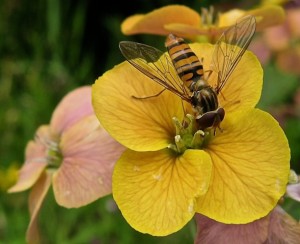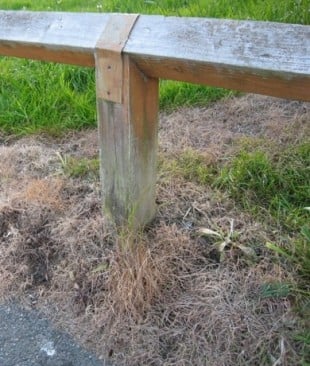Real change in the way we garden will only come about when we break through the communication failure between the vocal earth-friendly minority and the quiet majority who keep on buying chemicals.
When does change come? When do we look around and see it with our own eyes? When can we feel it in the air? How many virtual signatures, how many tweets, how many letters to MPs, to magazine editors, to local authorities, to supermarket bosses, to – add your choice here – does it take before positive, lasting change is real and graspable? Judging by some of the antics in the gardening world in recent months, the answer is clearly a hell of a lot, and then some. Even that may not be enough.

As someone who draws much of their hope, optimism and sheer unblemished joy from gardening, I am rapidly losing heart – though not with gardening itself; for me that will always be a gentle yet powerful way of changing things for the better. Doing it in a mindful, earth-friendly way only adds extra oomph. Tending a garden or allotment, or even just a few patio pots or a window box, is where most of us can expect to have a one-to-one with nature. Watching a hoverfly going quietly about its egg-laying requires no hype, no media spin, no advertising, no one-click purchase, no bland gardening celebrity telling us how ‘awesome!’ it is (right though they’d be).
No; where I am truly losing heart is with the conversations – if we can call them that, in this age of instant connectivity – that we are having about gardening and its place in the natural world. Such conversations are littered with examples of dismal communication. It doesn’t help that if you dare utter words like ‘heart’ and use phrases like ‘I feel…’, you are instantly branded an eco-crank – the put-down from those who get the jitters whenever the herd-like status quo is challenged. Forget your feelings and instincts, and don’t mention ‘earth’ at any cost. It’s pragmatism, bits of paper telling us something is ‘safe’, celebrities, PR robots and increasingly, of course, ‘the economy’ that truly matter. But what also matters, hugely, is the ground on which we have these conversations.
Right now, a ‘big conversation’ is happening around one of the hottest topics that can quickly be changed for the better through the actions of gardeners. Unfortunately, much of it is taking place among a minority of the already ‘converted’, which I don’t mean as a put-down. By ‘converted’ I mean those folk who have scratched away the veneer of innocence that garden pesticides and weedkillers have acquired as must-have ‘everyday essentials’, who listen beyond smoochy celebrity assurances, and who think for themselves. But how do the unconverted fare – the vast majority, who don’t read gardening magazines or blogs, or listen to or watch gardening programmes, who probably don’t even think of themselves as gardeners, but who unwittingly trust what those who flog garden chemicals say? It’s crucial to find out, because real change lies here, with the uninformed many, not – much as I would like to believe it – with the already concerned, on-the-money and frustrated few.
A few weeks ago organic grower and gardener Nicky Kyle (who does great podcasts from her County Dublin polytunnel) took a photo in a Sainsbury’s supermarket, showing ‘Roundup’ weedkiller (which contains glyphosate) and other garden pesticides, sitting cheek by jowl with children’s birthday cakes. Nicky posted this on Twitter, and created a burst of interest, and the store soon responded to say it had moved the poisons elsewhere. Sainsbury’s ‘corporate’ excuse was simply, and sadly, that ‘mistakes happen’.

It was certainly a mistake to put a poisonous chemical which the International Agency for Research on Cancer (the specialised cancer agency of the World Health Organisation) recently classified as a ‘probable carcinogen’ (PDF) next to kids’ cakes. But the bigger and sadder mistake is that these poisonous, man-made chemicals, which we know pollute widely and turn up in our food and our pee, are now treated as mere commodities when we’re out shopping. Sadder still is that we’ve allowed this to happen, based on a bit of paper somewhere telling us all is well if they are used ‘according to the label instructions’. A person I saw recently, fumbling to squirt weedkiller along the path in their front garden, while a young child and a dog played alongside, had obviously studied the small print.
I wondered if they had any inkling that glyphosate weedkiller, which is being pumped onto our farmland, along our roads and pavements, and around our town centres and playing fields, in ever-increasing quantities, probably causes cancer. I doubt it, but why would they? These poisons have been sanitised and made oh-so-everyday by selling them alongside kids’ cakes, next to knickers, or opposite healthy, fresh vegetables. Stitch this faux-everydayness together with the mass advertising telling us that we’re too busy-busy to pull up weeds and you get a recipe for big sales and fat profits. And when gardening magazine editors sell the same message – a sop to their powerful advertisers that they’re onside – or when celebrities crow that glyphosate ranks alongside pickled onions in terms of its potential carcinogenicity, profits are a piece of cake. Dare to mention that pickled onions don’t cause global pollution or harm earthworms or essential soil fungi, that you won’t find residues of them in your bread (PDF), or that it’s unlikely you’ll breathe them in when sitting out in your garden, and you risk crackpot status. For those who would rather push them apart, joining the dots is a frightening, not to mention profit-denting prospect.

The way things are now – with a minority speaking up and trying to trigger a domino effect of real change, while the majority simply remain unaware of the pressing need for it – is just how garden chemical manufacturers (and others, such as peat-mining companies) like it. Keeping the ‘debate’ around the use of toxic, polluting chemicals between a minority of concerned, informed gardeners (sorry, I mean us green, organic eco-cranks) and their own lifeless PR machines, abetted by gardening editors and indifferent retailers, ensures it stays far removed from where most of the real change-makers are. Provided that the huge majority of folk who have gardens but don’t perceive themselves as gardeners keep on buying glyphosate weedkillers (or, say, bee-harming neonicotinoid bug-killers), and are soothed by the ‘pickled onion brigade’, then all is well, the profits of ignorance keep flowing, and little changes. So long as the media-fuelled myth that those nasty ‘greens’ are out to get gardeners still has legs, concerned voices are tuned out, and not much changes. While weedkiller clad in bright, cheerful packaging is stacked next to kids’ cakes in supermarkets, nothing will change.
We know where real change will come from, who the real change-makers are, and where they are – out tending their gardens. The quandary is how to find fresh ground where a new, meaningful and informing conversation can flourish, which will bring about the change that nature urgently needs – which is when we stop buying and using this stuff. Tit-for-corporate-tat-style ‘debate’ just won’t cut it any more; we’ve tried that, in the best of faith, and it’s failed. We need to find ground that’s not polluted by spin, or by the spoutings of celebrity. I don’t believe anyone who sows seeds or plants things – whether they see themselves as a gardener or not – actually wants to knowingly harm the natural world, so hopefully this won’t be too hard. This new conversation must inform, inspire and above all encourage a greater sense of inquisitiveness – so that weedkillers stacked next to cakes are seen through new, more critical eyes.
Let’s find that place, let’s have this vital conversation, let’s change things – for the better. That is, after all, what gardening is all about.
Text and images © John Walker
Find John on Twitter @earthFgardener










